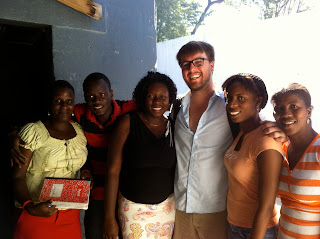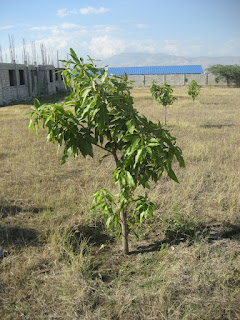“Bonye kohn bay, men li pa kohn separe”
(God gives, but doesn’t share)
-Haitian Proverb
It is the home of a people clothed in our half-hearted charity; boys wearing the uniforms of boy scout troops they we’re never in or women wearing the left-over youth group t-shirts for churches they will never visit. Broken down trucks line the streets, along with starving dogs, goats and skinny cows. Scores of vendors selling water for a few Haitian Gourde, only to hand the money over to another vendor who is selling something that many wouldn’t recognize as food, only to use that money to buy water from another vendor. We were all moved by the earthquake in 2010, but driving through the streets it’s hard to decide the difference between the damage done by the earthquake and the crumbling infrastructure from centuries of poverty, governmental power struggle and corruption and the decades of meddling by the U.S. government. This is the Haiti I experienced and it doesn’t seem to be getting much better anytime soon.
When I was asked to join my fellow St. Paul’s parishioner, Ted Cassidy, and a group from Huntsville, Alabama (Church of the Nativity) on a farming mission to the city of Thomazeau, I have to admit I was pretty cynical about the whole thing. The question that was swirling around in my head was, “does Haiti need anymore white people trying to ‘save’ it?” At one point on the trip I caught myself in a bit of a rant and uttered those words in the presence of Father Valmar (a Haitian priest, our host, known affectionately as Père Val), who gave a short chuckle.
 |
| Ted, little Ricardo and the team from Alabama |
 |
| Père Val and his wife Carmel |
 |
| in the back of the van |
There is a Haitian proverb that says, ‘there are mountains beyond mountains.’ That is to say, when you climb one mountain there is another mountain waiting beyond it. I believe that our Christian charity divorced from relationships is meaningless. God doesn’t call us to save the world: none of us have the super powers to refreeze the polar ice caps, or the energy to feed every mouth in Africa, or the money to fund all the TB vaccinations in Haiti. The hope of the Kingdom of God is found in relationships, in the way we serve one another, love one another, and remain faithful to each other. If you have ever experienced the power of forgiveness, or the peace of a loved one’s sobriety, or the healing being in community can bring, you know that our love for one another and connection to each other matters on profound levels.
 |
| Thomazeau: We built spent the week building an irrigation system for this community (center: schoohouse; right: church) |
 |
| digging trenches for the water pipes |
I write this to you, my friends, family, and church community, because you know me and I am asking from you a favor for a friend. I am writing to personally testify to the goodness and beauty that the work my church (St. Paul’s), The Diocese of Birmingham, The Diocese of South Carolina, The Diocese of Haiti and countless others, who are all relationally connected in the name of Jesus, have done for the people of Haiti. We are currently working to raise $120,000 to finish a nutrition clinic, to be named Lepswa Timoun (Hope for Children, Haitian Creole), we have been working on for the greater part of a decade. It will be run by Père Val, his wife Carmel, and their people that I came to know and love last week. It will be a place that wholly belongs to them (the place they are currently has a lease that will run out in October), that they will use to serve the people of Croix de Bouquets (a suburb of Port au Prince).
 |
| sunset at Thomazeau |
If you would like to contribute to our efforts please send a tax-deductible donation to:
St. Paul’s Episcopal Church
116 N. Academy Street
Murfreesboro, TN 37130
check memo: Hearts for Haiti
I am also planning on taking many more trips in the future (for the purpose of continuing relationships, financial accountability, lending a hand with the labor, leading trips, etc) and will need financial assistance for those trips. You can send tax-deductible donations to the above address with the memo line: Steve Lefebvre Missions.
Below are pictures of the Lepswa Timoun site in it's current state:












